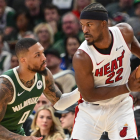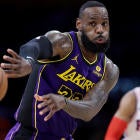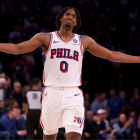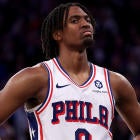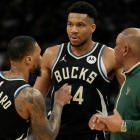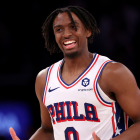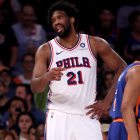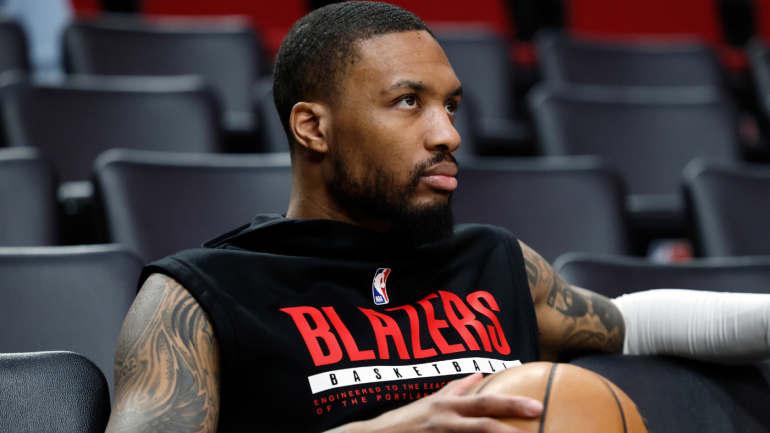
If you're looking for instant gratification, you've come to the right place. The 2023 edition of NBA free agency began on Friday evening, and -- as usual -- the deals came quickly and furiously. Draymond Green agreed to re-up with the Golden State Warriors, the Dallas Mavericks stayed in the Kyrie Irving business, and Fred VanVleet took home a whole lot of money.
Then, early Saturday, a report that was simultaneously shocking and inevitable came across the news feed: Damian Lillard officially wants out of Portland. Add Lillard to James Harden to make two superstar guards who are on the trade block, with possible multi-team deals on the horizon.
We obviously won't know how the free agency transactions will pan out until much later, but that will never stop us from prematurely judging them. Some teams have committed to dish out some serious cash early in the free agency period, without necessarily having a clear path to contention. Others worked around the margins, filling out their rosters with savvy role players rather than going for a headliner.
Here are some of the winners and losers from NBA free agency so far.
Winner: Fred VanVleet
A 6-foot-1 point guard who signed with the Toronto Raptors as an undrafted free agent in 2016, VanVleet just secured a 3-year, $130 million max contract from the Houston Rockets. If that's not a win, I don't know what is. Sure, he might have to endure a bit more losing than he's used to when he heads to Houston, but VanVleet is being brought in for his leadership and approach to the game as much as his on-court production. He'll be expected to help usher along the young Rockets while hopefully getting them headed toward the winning path. Plus, VanVleet will get to play with a young, up and coming team helmed by Ime Udoka, who last coached in the 2022 NBA Finals.
Loser: Dallas Mavericks
It was no secret that the Mavericks were expected to bring back Kyrie Irving, but the sticker shock of a three-year, $126 million deal is hard to wrap your head around. Irving was productive in the 20 games he played for Dallas last season, but the team went 8-12 in that stretch, and 5-11 when he and Luka Doncic were both on the floor. The Mavs didn't have many options, but to hitch your wagon to Irving -- who has had availability issues due to injuries, discipline and personal reasons over the past several seasons -- is a risky proposition. Were there other teams out there willing to pay Irving $40 million-plus per season, or were the Mavs bidding against themselves?
Even if he and Doncic thrive, Irving has a player option in the third year of the contract that could allow him to hold the Mavericks hostage once again. It could be a great contract if Irving can stay engaged and present on the floor, but history tells us that's simply not going to happen.
Winner: Kyrie Irving
He's certainly had his missteps, but the man just keeps getting paid. Irving's talent is apparent -- 27 points and six assists per game in each of the last four seasons -- and even though things haven't worked out with any of his last three franchises, he was able to negotiate a $126 million contract to play alongside one of the greatest young players in the league. You do you, Kyrie.
Loser: Toronto Raptors
Even when Kawhi Leonard was in town, Fred VanVleet was the heart and soul of the Raptors, so it's going to be a tough blow to see him leave. They quickly replaced him by agreeing to terms with Dennis Schroder, but the two-year, $26 million contract Toronto gave him seems a bit steep for someone who played for the minimum last season and shot 33% from 3-point range. He's certainly serviceable, but the drop-off from VanVleet is considerable.
Winners: Golden State Warriors and Draymond Green
That handshake emoji has never been more appropriate. Green has been synonymous with the Warriors for basically his entire career, and there wasn't much speculation that he would end up anywhere but Golden State. But he is a free agent, so there was always a chance that he could be lured by ... Greener pastures? (I'm sorry, it's been a long weekend -- and my editor let me.)
Instead, Green's four-year, $100 million deal was announced in the first minute of the free-agency window, locking up the Warriors' defensive genius, offensive playmaker and locker room leader for at least the next three seasons. (He has a player option in the fourth year.) Steve Kerr said his team has no championship hopes without Green, so he's more than happy to have him back alongside Steph Curry, Klay Thompson and new guy, vet Chris Paul, for the latest iteration of Warriors basketball.
Loser: Denver Nuggets
It's hard to call a franchise a loser when all of those fingerprints on the Larry O'Brien trophy are still fresh, but helplessly watching Bruce Brown agree to a $45 million deal with the Indiana Pacers must have been rough for the Nuggets. Brown was a crucial part of Denver's tight playoff rotation, but the Nuggets were limited by the salary cap in terms of how much they could offer him. He decided to take the money and head to Indiana, which is certainly his right, but the Nuggets must have been extra peeved when they saw that the Pacers hold a team option for the second year of Brown's deal. Denver still has the core of its championship roster, but Brown's skill set -- ball-handling, finishing, defense and 3-point shooting -- is difficult to replace.
On top of Brown leaving, the Nuggets also gave the taxpayer mid-level exception (two years, $10.3 million ... with a player option) to Reggie Jackson, who was jettisoned to the bench for virtually the entire championship playoff run. That seems like a high price to pay for a veteran leader when they could have used that exception to add value elsewhere.
Winner: Phoenix Suns
There are companies that take misshapen or bruised produce -- fruits and vegetables that are perfectly tasty but will never get picked by everyday grocery shoppers because of their untoward appearance -- and sell such bounty to restaurants at a discounted price. That's exactly how the Suns' bargain-bin shopping went on the first day of free agency. The new players they brought in -- Drew Eubanks, Keita Bates-Diop, Chimezie Metu and Yuta Watanabe -- along with the re-signing of Josh Okogie and Damion Lee, aren't going to make anyone's heads turn.
But those players hold significant value -- shooting, size, defense -- on team-friendly contracts with superstars Kevin Durant, Devin Booker and Bradley Beal already on the roster. It was clear that the Suns lacked depth last postseason, and they took some solid steps toward adding it through the free-agent market, even if they aren't exactly household names.
Loser: Portland Trail Blazers
The Blazers aren't losers because Damian Lillard officially requested a trade on Saturday. They're losers because they failed on two fronts over the past few seasons. They either needed to A) surround Lillard with pieces that made them a realistic championship contender, or B) trade Lillard at the peak of his value to commence a rebuild or retool. Now Portland is faced with a conundrum, because it wants to get as much as it can for Lillard, but it also wants to do right by arguably the best player in franchise history and send him where he wants to go (reportedly Miami or Brooklyn). On top of that, they just agreed to give Jerami Grant a five-year, $160 million contract, which may not be as easy to move as they hope.
The Blazers have two promising young players to build around in Scoot Henderson and Shaedon Sharpe, but they seemingly could have come away with more/better assets had they been proactive with a Lillard trade when it became clear that contention was out of the picture.
Winner: Cleveland Cavaliers
The Cavs' wing depth and 3-point shooting were major issues last season, and they plugged the holes with two above-average shooters in Max Strus and Georges Niang. According to NBA.com, Cleveland had the second-fewest 3-pointers per game from the forward position last season, and that's certainly going to change with Strus and Niang out there. More than anything, they're two players that defenses have to respect from 3-point range, which is going to open up the lane for dynamic guards Donovan Mitchell and Darius Garland, along with big men Evan Mobley and Jarrett Allen.
On top of the two shooters, the Cavs also brought back Caris LeVert on an extremely palatable (and tradeable) two-year, $32M contract. It's great when teams clearly address needs in the offseason, and that's exactly what Cleveland has done.
Winner: Milwaukee Bucks
Khris Middleton was never expected to leave, but he returned to the Bucks on a major discount from the $40 million option he declined. The real drama was with Brook Lopez, who was reportedly majorly courted by the Houston Rockets. Lopez leaving would have left a huge hole in the middle of Milwaukee's defense, which improved by a team-best 6.4 points per 100 possessions with him on the floor.
Perhaps most importantly, this should keep Giannis Antetokounmpo happy -- at least for the time being -- as he approaches probable extension discussions with the Bucks. Already with new ownership and a new head coach, Lopez leaving might have raised some questions for Antetokounmpo, who has consistently pledged his allegiance to Milwaukee. With the band back together, however, you'd have to think the Greek Freak is excited to shake off last postseason's failure disappointment and focus on winning another championship.














